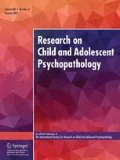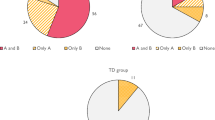Abstract
This article presents evaluative data on the use of the Diagnostic Interview for Children and AdolescentsRevised (DICAR) to classify DSM-IIIR disorders in the general population. Data for the analyses came from a probability sample (N=251) of parentchild/adolescent dyads aged 6 to 16 separately administered the DICAR on two occasions, 10 to 20 days apart, by trained lay interviewers and child psychiatrists. Data are presented on prevalence,testretest reliability, parentchild/adolescent agreement, and trained lay interviewerchild psychiatrist agreement. High prevalences of oppositional defiant disorder derived from parent assessments and overanxious disorder and dysthymia derived from adolescent assessments suggest that these disorders may be overidentified. Interview data provided by 6 to 11year olds to classify the internalizing disorders were too unreliable to be useful. Agreement between parentchild/adolescent dyads was generally low while agreement between trained lay interviewerschild psychiatrists was generally high.
Similar content being viewed by others
References
Achenbach, T. M., McConaughy, S. H., & Howell, C. T. (1987). Child/adolescent behavioral and emotional problems: Implications of cross-informant correlations for situational specificity.Psychological Bulletin, 101, 213–232.
Boyle, M. H. (1991). Children's mental health issues. In L. C. Johnson & D. Barnhorst (Eds.), Children, families and public policy in the 90s (pp. 73–105). Toronto: Thompson Educational Publishing Inc.
Boyle, M. H., Offord, D. R., Hofmann, H. G., Catlin, G. P., Byles, J. A., Cadman, D. T., Crawford, J. W., Links, P. S., Rae-Grant, N. I., & Szatmari, P. (1987). Ontario Child Health Study: I. Methodology.Archives of General Psychiatry, 44, 826–831.
Boyle, M. H., Offord, D. R., Racine, Y., Fleming, J. E., Szatmari, P., & Sanford, M. (1993). Evaluation of the revised Ontario Child Health Study Scales.Journal of Child Psychology and Psychiatry, 34, 189–213.
Brandenburg, N. A., Friedman, R. M., & Silver, S. E. (1990). The epidemiology of childhood psychiatric disorders: Prevalence findings from recent studies.Journal of the American Academy of Child and Adolescent Psychiatry, 29, 76–83.
Carlson, G. A., Kashani, J. H., De Fatima, Thomas, M., Vaidya, A., & Daniel, A. E. (1987). Comparison of two structured interviews on a psychiatrically hospitalized population of children.Journal of the American Academy of Child and Adolescent Psychiatry, 26, 645–648.
Cohen, J. (1960). A coefficient of agreement for nominal scales.Educational and Psychological Measurement, 20, 37–46.
Costello, A. J., Edelbrock, C., Dulcan, R. K., Kalas, R., & Klaric, S. H. (1984).Development and testing of the NIMH Diagnostic Interview Schedule for Children in a clinic population. Final report (Contract No. RFP-DP-81-0027). Rockville, MD: Center for Epidemiologic Studies, National Institute of Mental Health.
Costello, E. J. (1989). Developments in child psychiatric epidemiology.Journal of the American Academy of Child and Adolescent Psychiatry, 28, 836–841.
Edelbrock, C., & Costello, A. J. (1988). Structured psychiatric interview for children. In M. Rutter, H. Tuma, & I. Lann (Eds.),Assessment and diagnosis in child psychopathology (pp. 87–112). New York: Guilford Press.
Edelbrock, C., Costello, A. J., Dulcan, M. K., Kalas, R., & Conover, N. C. (1985). Age differences in the reliability of the psychiatric interview of the child.Child Development, 56, 265–275.
Feighner, J. P., Robins, E., Guze, S. B., Woodruff, R. A., Jr., Winokur, G., & Munoz, R. (1972). Diagnostic criteria for use in psychiatric research.Archives of General Psychiatry, 26, 57–63.
Herjanic, B., & Campbell, W. (1977). Differentiating psychiatrically disturbed children on the basis of a structured interview.Journal of Abnormal Child Psychology, 5, 127–134.
Herjanic, B., & Reich, W. (1982). Development of a structured psychiatric interview for children: Agreement between child and parent on individual symptoms.Journal of Abnormal Child Psychology, 10, 307–324.
Hodges, K. (1993). Structured interviews for assessing children.Journal of Child Psychology and Psychiatry, 34, 49–68.
Landis, J. R., & Koch, G. G. (1977). The measure of observer agreement for categorical data.Biometrics, 33, 159–174.
Malgady, R. G., Rogler, L. H., & Tryon, W. W. (1992). Issues of validity in the Diagnostic Interview Schedule.Journal of Psychiatric Research, 26, 59–67.
Reich, W., & Weiner, Z. (1988).Revised version of the Diagnostic Interview for Children and Adolescents (DICA-R). St. Louis, MO: Department of Psychiatry, Washington University School of Medicine.
Robins, L., -zer, J. E., Croughan, J., & Ratcliff, K. S. (1981). National Institute of Mental Health Diagnostic Interview Schedule.Archives of General Psychiatry, 38, 382–389.
Shaffer, D., Schwab-Stone, M., Fisher, P., Davies, M., Piacentini, J., & Gioia, P. (1988).A revised version of the Diagnostic Interview Schedule for Children (DISC-R). New York: New York State Psychiatric Institute, Columbia University College of Physicians and Surgeons, Division of Child Psychiatry.
Soeken, K. L., & Prescott, P. A. (1986). Issues in the use of kappa to estimate reliability.Medical Care, 24, 733–741.
Sylvester, C. E., Hyde, T. S., & Reichler, R. J. (1987). The Diagnostic Interview for Children and Personality Inventory for Children in studies of children at risk for anxiety disorders or depression.Journal of the American Academy of Child and Adolescent Psychiatry, 26, 668–675.
Welner, Z., Reich, W., Herjanic, B., Jung, K. G., & Amado, H. (1987). Reliability, validity, and parent-child agreement studies of the Diagnostic Interview for Children and Adolescents (DICA).Journal of the American Academy of Child and Adolescent Psychiatry, 26, 649–653.
Author information
Authors and Affiliations
Additional information
This work was supported by funds from the National Health Research and Development Program (grant number 6606-3760-42) and the Ontario Ministry of Community and Social Services, and was carried out by the Child Epidemiology Unit, Department of Psychiatry, McMaster University and the Child and Family Centre, Chedoke-McMaster Hospitals, Hamilton, Ontario. Dr. Boyle is supported by a William T. Grant Foundation Faculty Scholar Award; Dr. Offord by a National Health Scientist Award, Health and Welfare Canada; Dr. Szatmari by a Research Fellowship, Ontario Mental Health Foundation; and Dr. Fleming by a NARSAD Young Investigator Award. The authors wish to thank the Hamilton Board of Education, particularly Mr. Keith Reilly and Mr. Owen Jackson; principals and teachers of the Board; and parents and students for their help on this project. Our appreciation also extends to Ms. Barb Hall who assisted in the analysis of the data.
Rights and permissions
About this article
Cite this article
Boyle, M.H., Offord, D.R., Racine, Y. et al. Evaluation of the diagnostic interview for children and adolescents for use in general population samples. J Abnorm Child Psychol 21, 663–681 (1993). https://doi.org/10.1007/BF00916449
Revised:
Issue Date:
DOI: https://doi.org/10.1007/BF00916449




